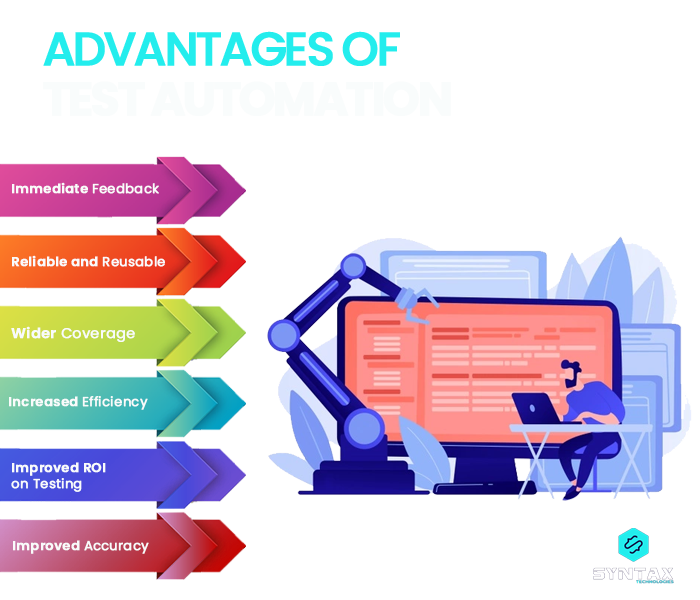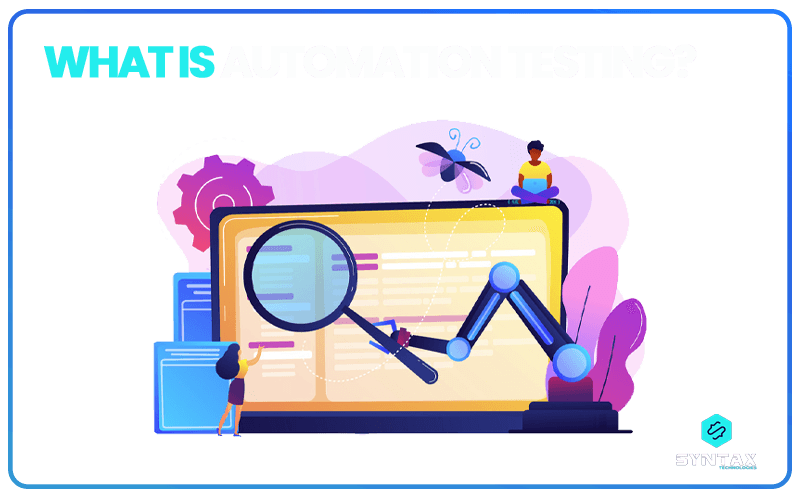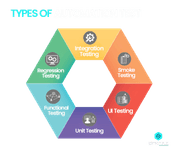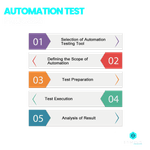The automation and what we’re doing now will make future testing go that much more efficiently. – Jeff Orr (Senior Vice-President of Products. Ventana Research)
Testing is one of the most crucial phases of a software development lifecycle. It is undertaken in order to evaluate the performance, quality and reliability of a product, before it is finally released into the market. The automation testing process is important to ensure that the end-product is bug-free and is able to meet the requirements of the customers.
The automation testing process can be conducted manually or through automated testing. However, since Manual Testing can be extremely time-consuming and laborious and might not guarantee accurate results, Automated Software Testing has emerged as the force of the future.
In this blog, we will look at the idea of Automated Testing by looking at different aspects.
What is The Essence of Automation Testing?
Test Automation is a technique in software testing which makes use of Test Automation Tools for executing a test case suite. The Software Test Automation Framework is so designed that it feeds data into the system and compares the actual outcome with the expected result, followed by generating a detailed test report. Regression Tests which are essentially repetitive in nature are usually automated.
Development cycles, which run in a successive manner, involve the execution of the same test suite repeatedly. An Automation Testing Tool can help in recording this test suite and replaying it as and when required. Automation of the test suite removes the need for human intervention.
The objective of Automation Testing is to lessen the number of test cases that are required to be executed manually and reduce manual effort, and not necessarily to be a replacement for Manual Testing.
Types of Automation Test
There are numerous types of tests that can be performed to test the viability of a product. In this section, we will look at some of the most common types of tests which can be safely automated.
- Integration Testing: The objective of Integration Testing is to understand the group behavior of the units and modules as they interact with one another.
- Regression Testing: This kind of test is important for ensuring that any kind of modification to the code does not have any negative impact on the functionality or on those features of the app which were already working correctly.
- Unit Testing: In this type of testing, a single unit is isolated and tested for its behavior, independently of the rest of the software. These are the unit tests. The objective is to observe the behavior of each unit, irrespective of their relation with other parts. It is usually performed during the development phase itself and is considered to be the first level of testing.
- Smoke Testing: This kind of testing is undertaken in order to ensure the stability or otherwise of a system. The objective is to ensure the proper working of the main functionalities before the testers move forth with further testing.
- Functional Testing: This is to ensure that the requirements of a software in terms of its functionality, operates as per the needs of the end-user.
- UI Testing: The user interface is what the user encounters as he/she opens an app. Testing this interface is a part of UI Testing. It makes use of test automaton tools which can record the interaction of a user with the interface and then mimic them automatically.
Why is Automated Testing Important?
Digitalization has become indispensable for industries cutting across sectors. Technology is being accepted as the driver of value and is being used in new and complex ways. Most of the organizations today offer some or the other kind of software. Their digital presence has made it important for them to look for ways that can improve efficiency. Thus, continuous testing has become an inherent part of an organization’s functioning. In understanding the importance of Automation Testing, it would be worthwhile to look at the advantages of the same.
Benefits of Automation Testing:
- It allows for fast results and immediate feedback: Manual Software Testing can be extremely time consuming, but with Automation Test, you can get the results quickly and have immediate feedback. It also allows for the execution of functional tests on different devices in a matter of hours. This helps in providing instant feedback to developers who can immediately set upon rectifying the errors and return the code to the testers.
- Wider Coverage: Test Automation not only helps in faster execution of test cases but also helps in simultaneous execution of tests on different platforms and devices. Automation Testing can help in launching a single test suite against various operating systems and devices. Furthermore, an increase in the number of tests implies greater test coverage of code and functionality. This results in the overall enhancement of the quality of software.
- Increased Efficiency and Improved ROI on Testing: Manual execution of repetitive tasks entail huge amount of resources. Since Automation Testing lifts much of the burden from the shoulders of the testers, it provides them with the time and opportunity to try and discover new test ideas that they wouldn’t have otherwise been able to think of. It provides them a chance to use their skills to detect bugs and defects that would have gone unnoticed.
- Reliable Results and Improved Accuracy: By way of lessening human involvement and with the help of reliable Test Automation Tools; an Automation Test is expected to provide far more accurate and reliable results than what is acquired through a Manual Tests.

Are you someone looking to make it through as an Automation Tester? Check out our blog on “Top 30 Automation Testing Interview Questions.”
How to Choose Automated Tests for Automation Testing?
There are a whole lot of different types of tests which are used to evaluate the viability of a product. Many of these tests can be safely automated, while some are not suitable for automation.
In this section of the blog, we will look at some of the criteria that should be kept in mind while choosing tests for automation. Tests that are suitable for automation generally exhibit certain fundamental attributes:
- Tests with determinant outcomes: Test Automation is advisable for situations wherein tests are held to have tentatively predictable outcomes. This happens when a specific function is determinant and hence it would mean that the test would have the same outcome every time it is run with the same input.
- Tests which are repeatable: Automation Testing is prescribed for test scripts which are extremely time consuming and need to be executed repeatedly over time. Automation is highly prescribed when one wants to perform high-volume batch testing or wants to test different browser combinations.
- High Risk Business Critical Tests: There can be tests, the interruption of which might result in considerable business loss. In such cases, conducting Automated Tests can be helpful as it can help in testing new features without necessarily posing any threat to the existing ones.
On much the same note, there are certain kinds of tests for which test automation is not advisable. Some of these are:
- Test Cases which have been only recently designed and have not been tested manually even once
- Test Cases which are executed only temporarily
- There are certain test cases whose requirements keep on changing. Automation Testing is not prescribed in such situations.
Automation Testing Process
The Test Automation process can be held to follow a series of steps:
- Selection of Automation Testing Tool: The first step involves the selection of appropriate tools that can help in conducting the test. This choice is dependent on the nature of the technology that the Application Under Test (AUT) is constructed upon.
- Defining the Scope of Automation: The Automation Scope pertains to the specified area of the AUT, which will be required to be automated. While determining the scope, one can keep certain points in mind:
- Technical viability
- Scenarios with large volumes of data
- Common functionalities cutting across applications
- Attributes that are important for business
- Complexity level of test cases
- Usage of the same test cases for testing across browsers
- Preparatory Stage: This phase would involve the preparation of a bsand e state, the test data as well as setting up the environment in which the test would finally takethe place. In case of most tests, data will have to be ,manipulated or the environment has to be in a certain speific state, before the test can proceed.
- Execution of the Test: This stage involves test execution as per the specifications laid out in the test scripts. The Automation Scripts require input data before they are made to run, after which they provide detailed reports. This process of execution can be carried out directly with the help of Automation Testing Tools or with the Test Management Tool which helps in invoking the automation tool.
- Result Analysis: Once it is clear that the test has run to its end and has identified every possible bug in ,he process; the result is put forth as either beingfailedsed or fail. However, if there happens to be any issue during the process of execution or the results turn out to be inconclusive, then the developers can opt for a complete review of the test script or might even rerun the test manually.

Test Automation Framework
An Automation Testing Framework pertains to certain specific guidelines which are important in:
- Improving test structuring and improving re-usability
- Minimizing the usage of code and sustaining consistency of Testing
- Reducing the training period of tools
- Providing for the involvement of non-technical testers in coding
- Involving data wherever necessary
In general, there are four types of Automation Testing Framework:
- Data-Driven Automation Framework
- Keyword Driven Automation Framework
- Modular Automation Framework
- Hybrid Automation Framework
Automated Testing Tools
There are many different types of automation tools that can be used for the purpose of conducting Automation Tests. Some of the popular ones are:
Selenium

It is an open source tool used for conducting Selenium Automation Testing. It is generally used for Regression Testing as it offers playback and recording facility. Recorded scripts can be exported in other languages, it can be integrated with TestNG and JUnit, multiple tests can be executed as well as comments can be inserted in the middle of the script.
Ranorex Studio

It is a multipurpose Test Automatithatol that has quite wide coverage in terms of the types that that can be executed through it. It can be used for data-driven data tests, regression tests, functions,al UI tests, and others. It provides a simple GUI and can help in automating tests for mobile, web as well as desktop applications.
Lambda Test

When it comes to cross browser testing, Lambda Test is the first Automation Testing Tool of choice. They provide a secure, super-fast and scalable Selenium Grid which can be utilized for executing test cases in as many as 2000+ OS and browsers.
Quick Test Professional (QTP)
It is essentially used for regression and functional testing. It makes use of the Keyword Driven Automation Framework and allows users to generate test cases directly via the application. It is easy to use and can even be utilized by a non-technical person for creating test cases.
Watir

It is an open source Automation Testing Tool which is widely used for regression testing. It facilitates writing of tests which can easily be read and maintained. Only Internet Explorer is supported by Watir; however, Watir WebDriver supports Opera, Chrome, FireFox and others.
How to Choose the Right Test Automation Tool?
There are many different types of Automation Testing Tools; however, choosing the right one for the task at hand, can be an extremely challenging job. It is important to understand that there is no universal answer with respect to the best tool which can be used for all times. The choice can be governed by certain criteria:
- Usability and Environment Support
- Database Testing and Object Identification
- Image Testing and Object Mapping
- The kind of scripting language used
- The kind of tests supported by the tool
- The ease with which it could help to debug software automation scripts
- Its ability to generate detailed results and reports
- The objective to be achieved
Before one goes on to choose a particular Automation Testing Tool, it is important to be clear about the requirements of the test, the goal to be accomplished as well as the features of different tools.
The automation market is filled with multiple testing tools for the purpose of conducting automated tests.
Conclusion
It is evident that Automation Testing is a significant solution to address the limitations of Manual Testing. An Automation Test is faster and more clear-cut, without extensive human errors. However, Test Automation is not necessarily a substitute for Manual Testing. Each of the approaches has its own set of pros and cons.
If the software being developed, happens to be too large and complex; Automation Testing is often the first choice; while there are certain kinds of test cases wherein conducting a Automation Test would be futile. Business Testers, Software Development Engineer in Test (SDET) and Software Developers, happen to be the prime users of Test Automation.
In the initial stages, investment in Automation Testing might seem to be cost prohibitive; however, the benefits which come in the long run is testimony to the fact that it pays for itself eventually.
Check out our blog on What is Selenium? to know more about this significant Automation Testing Tool.



